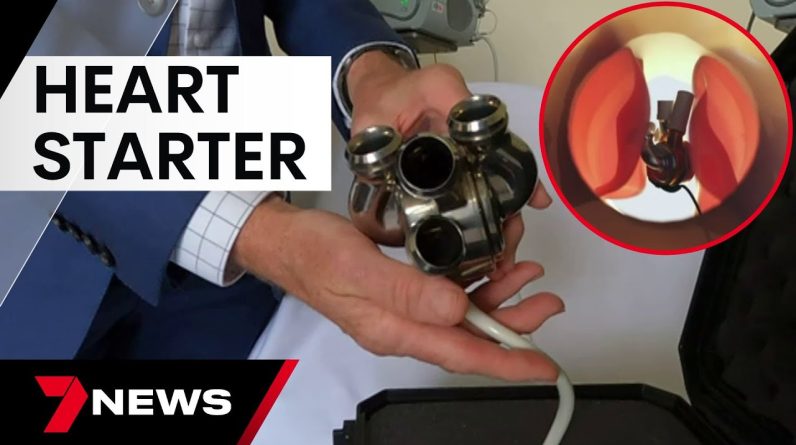Medical experts believe fast-tracked surgery will help save lives after hip fractures. Ambitious new guidelines are on the way to bring Australia into line with international standards.
Urgent Surgery: Vital for Elderly Patients’ Recovery
In an aging population, the demand for hip surgeries is increasing, necessitating the need for timely interventions.
New guidelines recommend shortening the time to surgery following a hip fracture injury from 48 to 36 hours.
Longer wait times not only increase the risk of complications but also impede recovery.
Delays in surgery can extend a patient’s hospital stay by two days.
Addressing these issues is crucial to improve the well-being and recovery outcomes of elderly patients at risk of life-changing injuries.
Key Takeaways
- Hospital operating theatres need to prioritize hip surgeries as Australia’s population ages.
- New guidelines recommend shorter wait times for surgery to improve recovery outcomes.
- Delayed surgery increases the risk of complications and prolongs hospital stays for hip fracture patients.
- Timely surgery and proper rehabilitation can improve recovery and restore confidence in elderly patients.
Importance of Timely Surgery for Elderly Patients
Timely surgery is essential for elderly patients as it significantly improves their recovery outcomes and reduces the risk of complications.
Hip fractures, a common injury among older individuals, can have a severe impact on their quality of life. Delayed surgery increases the risk of complications and prolongs hospital stays. In fact, every additional day the operation is delayed typically adds two days to a patient’s hospital stay.
The Australian and New Zealand Hip Fracture Registry’s annual report found that some patients waited as long as 92 hours for surgery, indicating the need for improved timeliness.
Regional Transfer Challenges for Elderly Patients
Transferring elderly patients to different hospitals for surgical procedures presents logistical challenges in regional areas. This practice is common in regional areas where specialized surgical services may not be readily available.
The transfer of patients for surgery becomes even more complex when dealing with elderly patients who require additional care and support during the process. The need for timely surgery for elderly patients is crucial, as delays can increase the risk of complications and prolong hospital stays.
However, in regional areas, limited resources and long distances between hospitals can hinder the prompt transfer of elderly patients. These challenges highlight the importance of improving infrastructure and coordination between hospitals to ensure timely and efficient transfers, ultimately improving the outcomes and recovery of elderly patients requiring surgical procedures in regional areas.
Reasons for Delayed Surgery in Elderly Patients
Delays in surgical procedures for elderly individuals with hip fractures can occur due to various factors. One of the reasons for these delays is the limited availability of operating theatres, which can result in a backlog of patients needing surgery. This issue is further exacerbated by the need to prioritize hip fracture patients within the emergency theatre complex, as their injuries require urgent attention.
In most states, theatre availability is the top reason for a delay of more than 48 hours. To address this issue, key changes are required at the systems level. This includes implementing priority allocation of hip fracture patients within the emergency theatre complex, ensuring that they receive the necessary surgical intervention in a timely manner.
In addition to addressing theatre availability, the guidelines for treating hip fractures have evolved to include other important considerations. One such consideration is the assessment and management of a patient’s nutrition and frailty. Recognizing that these factors can impact the surgical outcome, healthcare providers now take them into account before proceeding with surgery.
Undiagnosed delirium is another factor that can contribute to delayed surgery. An analysis of registry data revealed that a significant percentage of hip fracture patients diagnosed with delirium did not undergo a cognitive assessment before surgery. This raises concerns about undiagnosed delirium and highlights the need for improved pre-surgical evaluations.
These factors collectively underscore the importance of addressing delays in surgical procedures for elderly individuals with hip fractures. By ensuring timely and effective treatment, healthcare providers can improve patient outcomes and minimize the impact of these injuries.
Undiagnosed Delirium in Elderly Patients
Undiagnosed delirium in older individuals with hip fractures can have significant mental health impacts and should be properly assessed before proceeding with treatment.
Delirium, characterized by a sudden change in cognitive abilities, is a major risk factor for dementia. It can be triggered by changes in an older person’s health, such as infection or new medication.
Despite its potential consequences, a concerning number of hip fracture patients with delirium are not assessed before surgery. An analysis of registry data revealed that only 39% of these patients underwent a cognitive assessment, leaving one in four patients with undiagnosed delirium.
This raises concerns about the mental health impacts that may go unrecognized and untreated. To address this issue, the new clinical care standard emphasizes the monitoring of delirium symptoms and the proper assessment of patients before proceeding with treatment.
Impact of Timely Surgery on Elderly Patients’ Recovery
A timely operation following a hip fracture is essential for optimizing outcomes and minimizing potential complications in older individuals. Research has shown that longer wait times for surgery increase the risk of complications and prolong hospital stays. Therefore, it is crucial to prioritize and expedite surgery for hip fractures in order to improve recovery outcomes.
The new guidelines recommend a maximum time to surgery of 36 hours, which is a reduction from the previous 48 hours. This change aligns Australia with international standards and recognizes the importance of timely intervention. Timely surgery not only helps alleviate significant pain but also restores confidence in patients and improves their overall recovery.
Surgical Guidelines to Improve Elderly Patients’ Recovery
Surgical guidelines have been developed to enhance the recovery of elderly patients. These guidelines aim to improve the outcomes of surgical procedures for older individuals, particularly those undergoing hip fracture surgery.
One key recommendation is the implementation of faster turnarounds in operating theatres. To achieve this, the maximum time to surgery following a hip fracture injury will be shortened from 48 hours to 36 hours. This reduction in wait times is crucial as longer delays increase the risk of complications and hinder recovery.
Additionally, the guidelines emphasize the need to assess and manage patients’ nutrition and frailty before surgery, as well as monitor and address symptoms of delirium.
Addressing Mental Health Impacts in Elderly Patients’ Recovery
One often overlooked aspect of elderly patients’ recovery is the impact on their mental health. Falls and fractures can have significant psychological effects, leading to anxiety, depression, and a loss of confidence.
It is important to address these mental health impacts during the recovery process to ensure a holistic approach to patient care. Timely surgery and proper rehabilitation can play a crucial role in improving mental well-being. Surgery for hip fractures, in particular, can alleviate significant pain and restore mobility, which can positively impact a patient’s mental state.
Additionally, providing adequate support and resources for psychological counseling and therapy can further enhance the recovery journey for elderly patients. Recognizing and addressing the mental health aspects of recovery is essential for promoting overall well-being and quality of life in older individuals.
Rehabilitation and Confidence Restoration in Elderly Patients
Rehabilitation plays a crucial role in restoring mobility and confidence in older individuals recovering from hip fractures. After undergoing surgery, it is important for patients to engage in a comprehensive rehabilitation program to regain their independence and quality of life.
Physical therapy is a key component of this process, as it helps to strengthen muscles, improve balance, and increase range of motion.
Occupational therapy is also essential, as it focuses on helping patients regain their ability to perform daily activities such as dressing, bathing, and cooking.
Additionally, psychological support is important to address the emotional impact of the injury and promote mental well-being.
Rehabilitation not only helps older individuals regain their physical abilities, but also boosts their confidence, enabling them to resume their normal activities and live an active and fulfilling life.
International Standards for Timely Surgery in Elderly Patients
Adhering to international standards for timely hip fracture interventions is crucial to ensure optimal outcomes for older individuals at risk of life-changing injuries. The importance of timely surgery for hip fractures cannot be overstated.
New guidelines recommend faster turnarounds to improve recovery outcomes, with the recommended maximum time to surgery shortened from 48 hours to 36 hours. Longer wait times for surgery increase the risk of complications and impede recovery. Every additional day the operation is delayed typically adds two days to a patient’s hospital stay.
Delayed surgery is particularly concerning for patients who are transferred to a new hospital for surgery, as they often experience increased wait times.
Frequently Asked Questions
What Are the Common Challenges Faced in Transferring Elderly Patients for Surgery in Regional Areas?
The common challenges faced in transferring elderly patients for surgery in regional areas include limited availability of operating theatres, delays in priority allocation of hip patients, and longer wait times, which increase the risk of complications and prolong hospital stays.
What Are the Key Reasons for Delayed Surgery in Elderly Patients With Hip Fractures?
Delayed surgery in elderly patients with hip fractures is often due to limited theatre availability. Timely surgery is crucial to avoid complications and prolonged hospital stays. Pain, delirium, and inadequate assessment of cognitive health are also contributing factors.
How Often Is Delirium Diagnosed in Elderly Patients With Hip Fractures, and Why Is It a Concern if Left Undiagnosed?
Delirium is diagnosed in 39% of hip fracture patients, with 25% not being assessed before surgery. Undiagnosed delirium can lead to significant mental health impacts. Proper assessment and monitoring are crucial to mitigate potential risks.
How Does Timely Surgery Impact the Recovery of Elderly Patients With Hip Fractures?
Timely surgery is crucial for elderly patients with hip fractures as it improves recovery outcomes and alleviates significant pain. Proper rehabilitation following surgery can restore confidence and overall improve the patient’s quality of life.
What Are the International Standards for Timely Surgery in Elderly Patients With Hip Fractures?
International standards for timely surgery in elderly patients with hip fractures recommend a maximum time to surgery of 36 hours. Timely surgery is crucial for improving recovery outcomes, alleviating pain, and restoring confidence in patients.
Conclusion
In conclusion, timely surgery is vital for the recovery of elderly patients with hip fractures. The new guidelines recommending a maximum wait time of 36 hours instead of 48 hours are crucial in preventing complications and promoting successful recovery.
The limited availability of operating theatres and the presence of undiagnosed delirium are significant factors contributing to delayed surgery. By addressing these issues and prioritizing hip fracture patients, healthcare systems can improve outcomes and ensure the well-being of older individuals at risk of life-changing injuries.
Albion News is a great place to find informative, up-to-date news articles. We provide a wide range of unique articles that offer an interesting perspective on current events from around the world and from various different sources. You can easily search for the topics that matter most to you and explore in-depth pieces that provide insight into the issues and important debates occurring today. Albion News helps you stay informed with carefully researched and credible stories!







